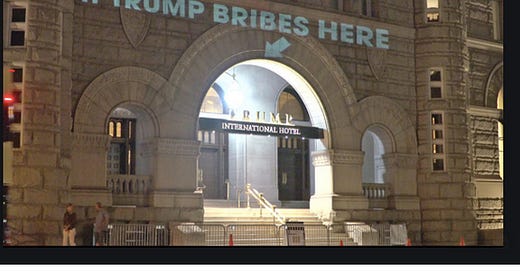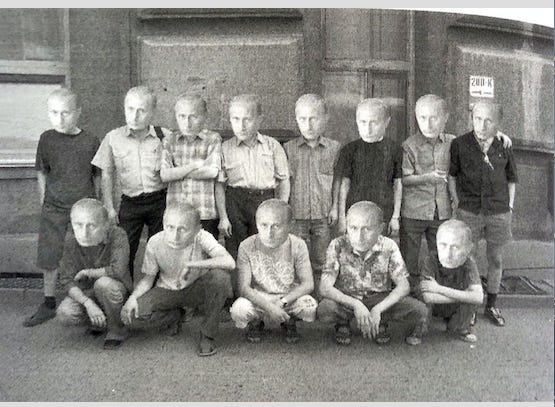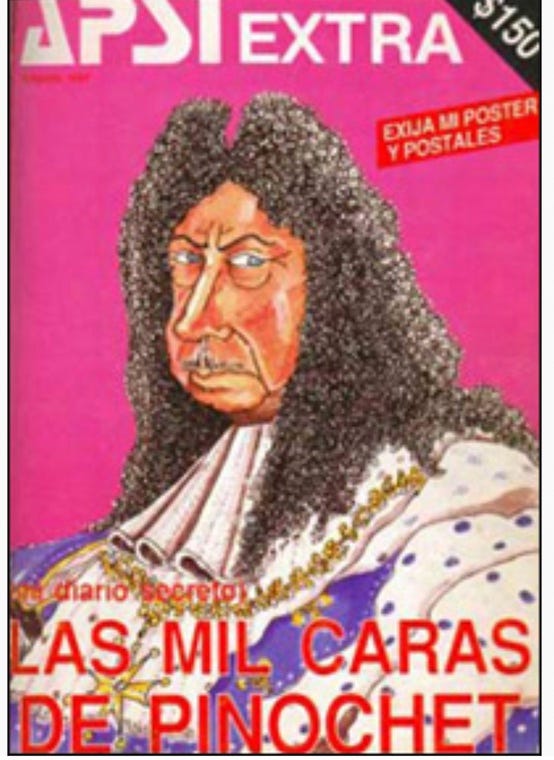It's the summer of weird —the adjective of choice for strange and surreal Republican behavior that has been normalized— and it's the summer that humor has come into its own in America as an effective weapon of anti-authoritarian politics. Autocrats want to be feared, not liked, and so they don’t mind being called evil. Yet making fun of them is off limits, as those who have dealt with insult suits in Recep Tayyip Erdogan's Turkey or faced prison in Vladimir Putin's Russia can attest.
Humor can be a way to cope with fear and dread in circumstances where freedom has been vanquished. Journalist Masha Gessen has written that jokes “reclaim the power to define –and inhabit—reality” in situations where people can feel powerless, even if those jokes can seem ghoulish to outsiders fortunate enough to be unfamiliar with such realities. “Did you hear about the new bus line that runs from the National Stadium (site of mass detention and torture in Santiago) to the cemetery? Pinochet is really efficient!" This was "gallows humor" during the Chilean dictatorship.
Humor can also wake us up to situations of corruption and injustice by getting us to see people, places and situations that we may have come to regard as inevitable or ordinary in a new light. That was one goal of the projections the artist Robin Bell staged on the facade of Trump International Hotel during Trump's presidency, from a May 2017 work that read “Pay Trump Bribes Here” to 2018's "This is a Sh*ithole," with its whimsical poop emojis (this projection responded to Trump saying that he did not want immigrants from Haiti and other majority non-White “shithole” countries).
Bell’s projections transformed a bastion of the Trump brand of "glamour" into a space of resistance, sending the message "that what we are experiencing is not normal," as he told me in a 2018 interview. The message, and the medium, have held up. The Democratic National Committee projections on Trump Tower Chicago, created for the 2024 Convention, paid homage to Bell's work. “Harris Walz. Joy and Hope,” this one reads.
We can track narrowing climates of political expression and cultural freedom in authoritarian states by government reactions to satirical humor. As strongmen consolidate their power, they become more insecure and thus less tolerant of criticism, even if that criticism is made in jest.
Putin is a good example. He became president of Russia in 2000, and while he was building his leader persona and institutional bases it was still possible to make art such as this 2004 collage by Blue Noses without incurring fines, visits from government thugs, or worse. It pokes fun at Putin’s personality cult by transforming a classic camp or school group photo. Every boy can aspire to be Putin, it says, and there is no room for anyone else.
Such satire became harder to get away with as protests and discontent mounted and Putin engaged in free speech and assembly crackdowns, most notably as of 2012. By 2017, cartoons or other satires of Putin could be labeled as “extremist material,” and by 2019 anyone found to "disrespect" the state and its representatives and symbols on line or in any other venue could spend 15 days in jail.
In other countries where democracy has been vanquished or is being threatened, humor that disrupts the everyday and makes us do a double take has been equally powerful. This cartoon of Pinochet as Louis XIV by Chilean graphic artist Guillo Bastías, which appeared on the cover of the magazine Apsi in 1987, was threatening enough to the regime that the magazine’s editors were sent to jail for “extremism."
Some demagogues use their voices effectively to harangue, seduce, and threaten populations (Adolf Hitler stands out here). Art that appropriates their voices, placing their now-disembodied words into a different context, or a different body, can emphasize just how deranged and hateful their words can be.
Comedian Sarah Cooper works in this vein, "inhabiting" Trump's words and placing them into a totally different frame that makes us listen with new attention to his racist and often crazy declarations. Cooper redoubles the distancing and the humor by also playing an individual who reacts to Trump's pronouncements in an ironic and sometimes shocked manner, as in this 2020 video, “How to Cognitive.”
Authoritarians do have their own twisted sense of humor. Most of them are sadists, so they enjoy humiliating people, including their sycophantic elite enablers. Benito Mussolini loved to make fun of anti-fascists who had "repented" to reduce their prison sentences; he would read their confession/conversion statements out loud in Parliament, mocking them for having capitulated to him.
Trump behaves similarly, whether he is humiliating his GOP lackeys on television or mocking a disabled reporter. The point is to cultivate cruelty in his followers. Getting them to laugh with him means, at least in that moment, that they are not laughing at him — being ridiculed is the thing strongmen most fear.
Authoritarians succeed when their extremism and exceptionalism —the violence, the theft, the disregard for human lives other than their own— is normalized. Humor that calls this out can be deeply validating. So as the days grow shorter and the election approaches, let the spirit of the summer of weird continue. Political satire is not only funny, but also sound anti-authoritarian strategy.










You can't beat Barack Obama's hand gestures when he mentioned Trump's obsession with crowd size. The gesture was subtle -- small, you might say -- but the point was clear and true.
When half the country trusts their political leaders to tell them who to pray to, and their religious leaders who they should vote for, yeah, I’m ready for a good laugh!